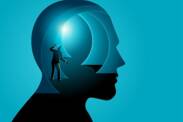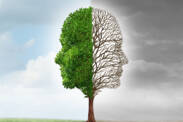Behavioural Manifestations of Medical Conditions

Concentration disorders
They can be a symptom of chronic fatigue, sleep disorders or sleep apnoea. They occur in hyperthyroidism, iron deficiency, and also in pediculosis (scarring). They are often the result of trauma or other brain damage. A large proportion are psychiatric disorders, ADD or ADHD.

Paranoid
Paranoia is a disorder that can exist as a separate entity, but also as part of another psychiatric disorder. The person manifests with traits such as exaggerated jealousy, assertion of one's ego, exaggerated concern for one's person, stigma, and feeling threatened. He or she establishes unverified conspiracy theories, but may also have an exaggerated sense of neediness and importance to others and the world.

Speech disorders
Speech is our tool of communication. It serves us in the form of words. It can be spoken as sound, but also in the form of writing. Both forms need to be able to be processed, understood and ultimately produce a response. Sometimes, however, it malfunctions. It can be the result of damage to the neurological system or even disease outside it.

Anxiety
Anxiety is an unpleasant feeling that is quite common in the course of life. However, it can also be a mental illness, specifically an anxiety disorder. What is anxiety and how does it manifest itself? How to treat this condition appropriately?

Hallucinations and delusions
Hallucinations, delusions and illusions are the most common manifestations of psychological disorders. Sometimes they can be short-lived. They are pathological thinking and a disturbance in the perception of reality. What is the difference between a hallucination and a delusion? When is it necessary to see a doctor?

Depression - depressed mood
Depression, sadness, despondency, loss of interest and mood disturbances. Emotions that have a psychological and physical impact. What is the cause? What associated difficulties can be expected?

Dementia
Can dementia be a symptom of another disease? Yes, it can. What is dementia? What are its types and causes?

Aura
Aura occurs in seizure disorders such as epilepsy or migraine. These are unusual sensations that do not normally occur.

Apathy
The concept of apathy has many interpretations in the general public. It expresses indifference and lack of motivation, interest and emotion. How does apathy manifest itself? Why does it arise? How to motivate oneself properly and when to seek professional help from a doctor?

Confusion
It occurs acutely, but also chronically. It is caused by low oxygen or blood sugar levels. It occurs with poisoning, fever, especially in children and the elderly. It can also be caused by various diseases, such as heart, liver or psychiatric disorders. It is a condition in which reality is perceived morbidly.

Mood disorders
Our mood depends on many external and internal factors. If the mood is altered over a long period of time, or if the changes are recurrent, it points to a problem. Mood can be morbidly good or bad. Affective disorders occur in childhood, but also in adulthood or old age. Most of the time it is a mental disorder, sometimes the cause is in another underlying illness.
Symptoms related to behaviours, manifestations and conditions are of a different nature and are not always pathological in nature, but are often normal manifestations of the human organism. Some of these manifestations occur only very rarely, others are quite frequent but may also depend on external circumstances and environmental influences, which means that they are not always related to disease or ill-health. Most of them, however, have a basis in health problems.
Some of the symptoms relate to human behaviour, which is very often affected by illnesses, both mental and sometimes physiological, and these symptoms can in many cases also be related to serious personality disorders, so they should certainly not be overlooked. On the contrary, a person should seek a medical examination if, for example, he or she notices signs and symptoms of disorientation, paranoid behaviour, impaired concentration or even signs of dementia.
A number of manifestations caused by disease causes may not be apparent from the outset and may develop over a long period of time. For example, excessive sleepiness, punctiliousness or shyness, where the development of these manifestations is more long-term in time and their intensity may alternately increase or decrease depending on the current situation. Often, however, they may be symptoms of more serious disorders, either of a mental nature or of a nervous system disorder.
While some symptoms may not be too serious at first glance and may not even be considered dangerous, such as excessive sneezing or snoring, other symptoms can be a threat not only to the person but also to those around them. This applies to frequent and repeated aggression, behavioural disorders, personality changes and so on. At other times, there may also be signs of incipient illnesses that significantly affect a person's personality, such as a decline in intellect or learning disabilities.
Manifestations of mental disorders
Depression is a state of excessive sadness and many times it is overlooked. However, a state of excessive depression is already a serious symptom that can be related to several mental illnesses, for example, even manic-depressive psychosis, but also to illnesses such as bulimia, hypochondria or Asperger's syndrome. This condition can also be caused by physiological discomfort and illnesses and is not purely a symptom associated exclusively with certain mental illnesses.
Similarly, apathy, a state of disinterest, can often be related to depression, but is also sometimes a symptom of work overload or degenerative brain diseases. However, people with aggressiveness are also dangerous to their surroundings and therefore this symptom belongs in the hands of a professional. It can have a variety of causes, from alcoholism, to dementia, ADHD, manic-depressive psychosis, to a manifestation of brain disease. A typical manifestation of alcoholism is also aggressiveness, but also the so-called alcohol window.
A very common symptom of a mental or psychiatric disorder is paranoia. This symptom is suffered by people with paranoid disorder, manic-depressive psychosis, disturbances in the perception of reality, and is also typical of schizophrenia. Similarly, the occurrence of hallucinations and delusions, which are associated both with mental illnesses such as manic-depressive psychosis or alcoholism, and with thinking disorders such as Alzheimer's disease or dementia, is also a typical symptom.
Symptoms associated with neurological diseases
Symptoms associated with diseases of the nervous system include, for example, a predilection for routine activity. This is a typical manifestation of autism or Asperger's syndrome. At the same time, however, it can also be a symptom of obsessive-compulsive disorder, which is already a mental disorder. This disorder also manifests itself in exaggerated and excessive meticulousness. Excessive perfectionism is also a manifestation of Asperger's syndrome, although it is not a typical symptom. Of course, it does not always have to be a disease symptom.
However, shyness is typical of people with autism or Asperger's syndrome, both diseases of the central nervous system, specifically the brain. Excessive shyness is also a manifestation of social phobia, sometimes associated with antisocial behaviour. Learning disabilities are a typical symptom of neurological disease, especially in the case of a disorder called ADHD, which is also characterised by concentration disorders. Learning disabilities are also associated with dyslexia or dysgraphia, for example.
Decreased intelligence also accompanies several neurological diseases, especially dementia, Alzheimer's disease or some diseases associated with memory impairment. In children, it is often associated with polio. As such, dementia is both a symptom and a separate neurological disease and is associated with behavioural changes. At the same time, dementia is a symptom of serious brain diseases, such as brain haemorrhage, but it also accompanies alcoholism.
Many times confusion is associated with dementia, but also with memory disorders and neurological diseases. This occurs, for example, in Alzheimer's disease or in infectious diseases of the nervous system. It is also sometimes associated with life-threatening conditions such as intoxication or stroke. In connection with confusion, a person may also be disoriented as to where he or she is or have time disorientation, which is also typical of intoxication and Alzheimer's disease.
Problems with concentration and agitation
A typical manifestation of concentration problems is hyperactivity. This is the excessive mental or physical activity that accompanies many illnesses, be it ADHD, hyperthyroidism, manic-depressive psychosis or sometimes intoxication. Sometimes it is only temporary, but other times it is long term. People with concentration problems also have trouble concentrating, which is a typical symptom for Down syndrome, chronic fatigue syndrome, hormone overproduction and also ADHD.
Increased agitation is also characteristic of nervousness. This symptom is many times related to psychological, but often also physiological causes. Often, nervousness occurs in hypochondria, Alzheimer's disease, migraine or ADHD and can always have a different cause or stimulus. Similarly, restlessness, which is a condition where a person cannot remain in one position or without some activity, is also manifested. This is how hyperthyroidism, dementia or even hypochondria manifests.
Mood, personality and behavioural disorders
Mood disorders are a typical manifestation of manic-depressive psychosis or ADHD, but they also occur, for example, in alcoholism, dementia, during delirium, and also due to some physiological causes, such as pain and so on. Anxiety, which is a state of excessive fear, is also a serious problem. This condition is typical of phobic and anxiety psychological disorders, but also accompanies, for example, hypochondria, ADHD or Asperger's syndrome.
A very serious symptom is the overall change in personality that usually occurs with serious psychiatric and mental disorders and problems, such as schizophrenia or dissociative disorders. Personality changes also accompany alcoholism and occur in Alzheimer's disease. Behavioural changes are not a change in personality but only in the person's expression, for example, in manic-depressive psychosis, intoxication and neurological diseases such as autism or dementia.
Sleep problems and reflexive reactions
Among the reflexive reactions that belong to the manifestations of the human organism, for example, is sneezing. This is most often a reflex to clear the airways and is very often seen in allergic reactions. Snoring, on the other hand, is not a reflex, but a condition produced by the vibration of air as it flows through the upper respiratory system. It causes sleep problems and occurs, for example, in upper respiratory tract infections or in overweight people.
A big problem with sleep is excessive sleepiness. This symptom is a serious disorder and can either be a prolonged night's sleep or sleeping well during the day. As a symptom, excessive sleepiness is present in anemia, hypothyroidism, chronic fatigue syndrome, manic-depressive psychosis during the depressive phase, also in anorexia, necrotizing enterocolitis and during infectious diseases of the brain. Very often it occurs together with excessive fatigue.









